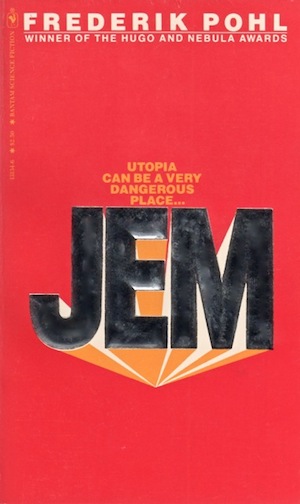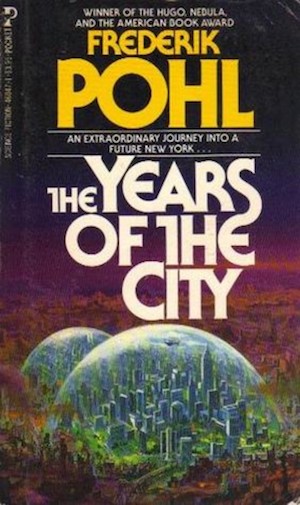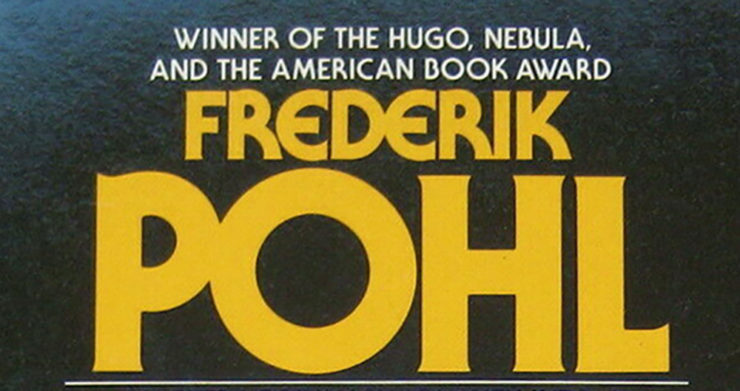Today would have been Frederik Pohl’s one-hundredth birthday. Pohl played many key roles in science fiction: big-name fan, editor, agent, and of course, author. Among his works are several frequently read and discussed classics. Other Pohl novels are equally fine (or so it seems to me) but appear to have slipped out of the public consciousness, at least to some degree. Here are five Pohl works of which you may not be aware that are worth your consideration…

In 1969’s The Age of the Pussyfoot, Charles Forrester wakes after five centuries of cryogenic preservation. The world he finds himself in might appear to be a utopia, save for one trifling detail. Utopian pleasures cost money. While Charles’ insurance payout may seem like a fortune in his eyes, he finds that it’s a pittance in 26th-century terms. No, it’s not that his fortune has been exhausted by inflation. It would be enough for his needs…if only he were willing to settle for life as a 20th-century rich man. He wants far more than that. He wants to be rich, 26th-century style. Charles needs to find work.
Too bad that his skills are five hundred years out date and that he has a shaky (at best) grasp on the realities of his new world. It would also help if he didn’t inadvertently facilitate an alien invasion—though avoiding that might be beyond his control.
There’s lots to enjoy in the setting Pohl imagined for Pussyfoot. This world of tomorrow isn’t overpopulated, exhausted, and poor. The people of the 26th century are far wealthier than we are. But the need to work hasn’t gone away; people still have to pay for all their dazzling goods and services. It’s a mundane utopia, but charming in its way.
Of particular note: almost every person in the novel has a handy device called a Joymaker: “a combination of telephone, credit card, alarm clock, pocket bar, reference library, and full-time secretary.”
Joymakers are clearly close cousins of our smartphones. Pohl imagined that this world might have taken centuries to develop Joymakers, but as he says in the novel’s afterword, he expected progress in the real world to be much faster: “I do not really think it will be that long. Not five centuries. Perhaps not even five decades.”
1969 + 50 = 2019. Not a bad guess.

1981’s satirical thriller The Cool War is set in a world where yet another oil crisis has pushed nations towards renewable energy sources. Unfortunately the new substitutes for oil are neither cheap enough nor abundant enough to maintain the old ways of life. This results in international rivalries as nations compete for scarce resources.
This doesn’t mean war. Open warfare would spell nuclear doom. While some weak souls might take that as a reason to resort to peace, the American visionaries known as the Team have found a way to fight wars by other means. Hapless Reverend Hake finds himself drawn into an unacknowledged war fought with very unconventional weapons. Specifically, Reverend Hake himself.
Perhaps to compensate for The Year of Pussyfoot’s visionary Joymakers, Pohl’s 2020 is rather backward compared to our 2019. Still, The Cool War’s mean-spirited sabotage campaigns (covert harassment intended to disrupt rival nations with whom no formal hostility has been declared) seem very timely in this age of fabricated or misleading news and covertly subsidized political chaos.

No discussion of authors of Pohl’s vintage would be complete without mentioning their shorter works.1972’s collection The Gold at the Starbow’s End contains five of Pohl’s finest, two of which are standouts.
The first standout is the title novella, in which a small crew of astronauts are dispatched on a slow voyage to Alpha Centauri. They have been assured that a world awaits them; this is a lie. There is no world and they have not been told of the true goals of their project. The project is a success. If only the geniuses who created the program had asked themselves what the consequences of success might be…
The other standout is 1972’s The Merchant of Venus. The discovery of alien relics on Venus has spurred colonization of that hostile world. Maintaining a human presence on Venus is fearfully expensive. It’s not subsidized by the home world; colonists must pay for their keep. This is a challenge for Audee Walthers, who is facing impending organ failure and doesn’t have the dosh to pay the doctor. What can he do to earn the huge sums he needs? Catering to the whims of a visiting plutocrat is not Audee’s first choice. It’s simply his only option.
Pohl’s Venus explores what capitalism might be like were it unfettered by any sort of human decency. Peons like Audee are entirely dependent on the largess of their betters. If they don’t work hard, they will die. SF often assumes that living on alien worlds could be less expensive than living on Earth. Pohl did not. Capitalism + high cost of living = precarity for Venus’ inhabitants.
Merchant of Venus also happens to be the first story in which Gateway’s Heechee appear.

In 1979’s Jem, tachyon drives provide access to the stars. However, one must first reach orbit, which requires expensive chemical rockets. Limited access to interstellar resources is of little help to Earth, which is resource-poor, people-rich, and split between three mutually hostile factions. The very existence of the garden world orbiting Kung’s Semistellar Object only exacerbates the tensions on Earth and pushes the overcrowded world that much closer to Armageddon.
Jem offers a vision of the 2020s firmly rooted in Disco Era-anxieties. It’s remarkable just how 1970s this novel is. But then, every SF novel becomes dated and quaint; some are still readable, some not. Jem is still readable. Its world is not quite our 2020s, but it’s at least an entertaining alternative.

Science fiction has often taken a dim view of cities, seeing them as festering hives of lazy, violent people. 1984’s The Years of the City imagines a different future. Its five novellas carry the readers into New York’s future in generation-long steps, steps that take the city from the troubled metropolis of the “FORD TO CITY: DROP DEAD” era to a prosperity that would have seemed unlikely to many of Pohl’s contemporaries. Pohl eschews the One Big Fix preferred by so much utopian fiction and imagines that city life has been improved by incremental steps. Instant utopias may be more dramatic and engaging, but slow improvement over generations has a glory of its own.
For more information on Fred Pohl, see this obit, Jo Walton’s tribute , as well as his autobiography, The Way the Future Was. His blog, The Way the Future Blogs, appears to be shuttered but an archive version can be found here.
In the words of Wikipedia editor TexasAndroid, prolific book reviewer and perennial Darwin Award nominee James Davis Nicoll is of “questionable notability.” His work has appeared in Publishers Weekly and Romantic Times as well as on his own websites, James Nicoll Reviews and Young People Read Old SFF (where he is assisted by editor Karen Lofstrom and web person Adrienne L. Travis). He was a finalist for the 2019 Best Fan Writer Hugo Award, and is surprisingly flammable.











Ebook readers: Age of The Pussyfoot doesn’t seem to be in the Kindle store, but is available directly from Baen in both Kindle (mobi) and epub formats, along with assorted others.
https://www.baen.com/the-age-of-the-pussyfoot.html
These five books are a really mixed bag–which is quite appropriate when talking about the work of Frederik Pohl. The Years of the City, Jem, and The Gold at the Starbow’s End are all superior books. I wouldn’t say that the five books are all overlooked classics. For starters, Jem was hugely successful when it was published. Also, “The Gold at the Starbow’s End” has long been considered a great classic, deservedly so. And The Years of the City, though it was not as successful as some of his books, but each of the five novellas in the book is simply terrific. Pohl has always been an advocate of government as a participation sport, and nowhere else does he so marvelously demonstrate ways in which government can be better in the future than it is today. Some of what he suggests–voting via one’s television–seemed like it might be dated, especially when the internet became available to tens of millions of people. But with the advent of streaming video and interactive TV, not so dated anymore. This point can be argued, but regardless, the book as a whole is, as Pohl himself freely acknowledged, a love letter to New York City, where he lived for a long time. It’s also just a lot of fun! “The Merchant of Venus” is also terrific, thrilling, even.
I confess I have not read The Age of the Pussyfoot, but the title has long intrigued me. And the Joymakers don’t surprise me at all. Pohl was, throughout his career, intensely interested in technology, and the interaction between tech and the people who use or are affected by it. Which doesn’t mean he necessarily would have embraced that device. But one can see in so much of his work an unfailing curiosity and fascination with tech, sociopolitical change, and how people deal with life under different circumstances, for better or worse. His fascination with the notions of wealth and money, and how perception of those two concepts can change depending on other factors is just one example of how Pohl processed the zeitgeist throughout his life, producing narratives that reflected different eras, as so much science fiction does, in ways that both entertained and enriched our understanding of our times.
“Jem” and “Cool War” are connected in my mind, because each seems to point to a particular flaw in human nature as a major cause of the world’s problem. In “Jem” it’s people’s expectation that other people will rationally realize that they’ve been outmaneuvered and will therefore surrender rather than escalate – while never noticing that their own response to being outmaneuvered is always escalation; in “Cool War” it’s abrogation of responsibility for one’s actions (hence the discussion of hypnotism, cults and the chain of command throughout that book).
All of Fred Pohl’s “Pohlemic” columns which appeared in my fanzine/semiprozine Algol (later Starship) and later Science Fiction Chronicle are in my Mac in MS Word. Despite several attempts to interest his agent in them, no luck. They started in 1976, ended in 1994. There’s certainly an e-book’s worth of stuff there.
Anyone in publishing interested, contact me, or Fred Pohl IV, off-list.
I enjoyed a great deal of Pohl’s work over the years, especially his memoir, The Way the Future Was, which I read about the same time as Damon Knight’s The Futurians. Much of the work Pohl did on his blog near the end of his life seemed to be material for an expansion of the book, but I haven’t heard of any such plans since his passing.
Great stuff. Unlike most of his contemporaries, Pohl improved with age. He only really started to hit his stride as a solo author in his late-40s or 50s (in sharp contrast with his contemporaries Heinlein and Asimov, who were descending into unreadability around the same time).
And Pohl’s and Knight’s book-length works have some roots in Harry Harrison and Brian Aldiss’s memoir anthology HELL’S CARTOGRAPHERS (the title referring to Kingsley Amis’s essays about SF collected as NEW MAPS OF HELL). The editors and their four contributors (Knight, Pohl, Robert Silverberg and Alfred Bester) all (save Bester) went on to produce at least one book-length expansion or collection of further autobiographical essays…Bester did offer slight’y revised versions of his essay for Harrison’s earlier anthology NOVA 4 and his Doubleday collections gathered together as STARLIGHT: THE GREAT SHORT FICTION OF AB.
The only one of the five that I’ve read is The Age of the Pussyfoot, which I remember quite enjoying. I always think of Pohl more as an editor. His contributions to the field in that capacity are immense. He was also a nice guy that I’d run into from time to time in “smoker’s exile” at cons, and we’d chat about the field while puffing on our cigarettes.
My favourite of his was the collection of linked short stories The Day After The Day The Martians Came about the varied reactions of assorted people and groups to the news that an expedition to Mars had found Martians and were bringing some back to Earth.
I think the best Fred Pohl serie is the “Gateway” and its following books on the echoes.
For those who haven’t read it, I envy you …
Xavier (fxd54@yahoo.com